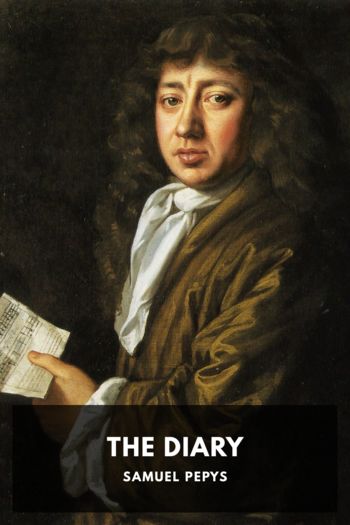The Diary, Samuel Pepys [e reader books TXT] 📗

- Author: Samuel Pepys
Book online «The Diary, Samuel Pepys [e reader books TXT] 📗». Author Samuel Pepys
Richard Cowling or Cooling. The name is usually spelt in the latter way in the Diary. The Lord Chamberlain was Edward, Earl of Manchester. ↩
For the king’s expression of regret at the loss of Charles Berkeley (Earl of Falmouth), see note 2528. ↩
On March 26th, 1658, the successful operation for the stone was performed at Pepys’s cousin’s (Mrs. Turner’s) house in Salisbury Court, and Pepys resolved to hold a commemorative feast for ever after on the anniversary of that day. On the first anniversary mentioned in the Diary, March 26th, 1660, he was at sea. In 1661 Mrs. Turner and her party dined with him at his father’s. In 1662 they all dined at Pepys’s house. In 1663 the dinner was postponed owing to Mrs. Pepys’s illness. In 1664 the feast was held on the correct day. ↩
See note 1684. ↩
Harman appears to have been the son of the Mr. and Mrs. Harman referred to on September 9th, 1664 (p. 239 of this volume). His wife, whom Pepys describes as “a very pretty, good-humoured wretch” (see August 1st, 1664), died in 1665, and Pepys then tried to get him to marry Paulina Pepys (see July 21st, 1665). ↩
Alderman Sir Richard Browne, Bart., was Lord Mayor in 1660–61, and Major-General of the Trained-bands; see ante, February 22nd, 1659–60. His son was Sir Richard Browne, Knight. Sir Richard Browne, the Clerk of the Council, noticed January 25th, 1661–62, was of a different family. The Lord Mayor was seated at Debden Hall, in Essex, which he had purchased soon after 1660, and the estate was alienated by his son, the second baronet. —B. ↩
Thomas Neale. ↩
See ante, June 2nd, 1665. ↩
Charles II’s letter of thanks to Lord Sandwich, dated “Whitehall, June 9th, 1665,” written entirely in the king’s hand, is printed in Ellis’s Original Letters, 1st series, vol. iii, p. 327. ↩
Of the four distinguished men who died after the late action with the Dutch and were buried in Westminster Abbey, the Earl of Marlborough was interred on June 14th, Viscount Muskerry on the 19th, the Earl of Falmouth on the 22nd, and Sir Edward Broughton on the 26th. After the entries in the Abbey Registers is this note: “These four last Honble Persons died in his Matyes service against the Dutch, excepting only that Sr Ed Br received his death’s wound at sea, but died here at home” (Chester’s Westminster Abbey Registers, p. 162). ↩
William Sheldon, Clerk of the Cheque at Woolwich. ↩
The Public Intelligencer, published by Roger L’Estrange, the predecessor of the London Gazette. ↩
The number of deaths in London from all diseases, in the week ending June 13th, was 558; of these 112 died from the plague. ↩
Captain Robert Holmes (afterwards knighted). Sir William Coventry, in a letter to Lord Arlington (dated from The Royal Charles, Southwold Bay, June 13th), writes: “Capt. Holmes asked to be rear admiral of the white squadron in place of Sansum who was killed, but the Duke gave the place to Captain Harman, on which he delivered up his commission, which the Duke received, and put Captain Langhorne in his stead” (Calendar of State Papers, Domestic, 1664–65, p. 423). ↩
John Harman, afterwards knighted. He had served with great reputation in several naval fights, and was desperately wounded in 1673, while engages with a Dutch man-o-war, which he captured. He survived the action some years, but never recovered his health. —B. For an account of the life of Sir John Harman, see Charnock’s Biographia Navalis, i 97–103. ↩
The Prince was Lord Sandwich’s ship; the captain was Roger Cuttance. It was put up at Chatham for repair at this date. ↩
Sir William Berkeley, see note, vol. iii, p. 334. His behaviour after the death of his brother, Lord Falmouth, is severely commented on in Poems on State Affairs, vol. i, p. 29
“Berkeley had heard it soon, and thought not good
To venture more of royal Harding’s blood;
To be immortal he was not of age,
And did e’en now the Indian Prize presage;
And judged it safe and decent, cost what cost,
To lose the day, since his dear brother’s lost.
With his whole squadron straight away he bore,
And, like good boy, promised to fight no more.”
—B. ↩
Jeremy Smith, knighted June, 1665. He succeeded Penn as Comptroller of the Victualling in 1669, and held the office until September, 1675. ↩
Captain Edward Grove commanded The Success in 1664. ↩
The Lord Treasurer (Earl of Southampton) lived at Southampton House on the north side of Bloomsbury Square, which afterwards came into the possession of the family of Russell owing to the marriage of Lady Rachael Russell, and was then known as Bedford House. ↩
John Colvill of Lombard Street, see ante, May 24th. He lost £85,832 17s. 2d. by the closing of the Exchequer in 1672, and he died between 1672 and 1677 (Price’s Handbook of London Bankers). ↩
Club =





Comments (0)